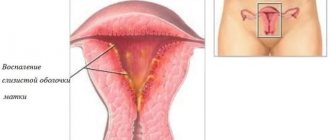Why is swelling observed during ovulation?
Every month, the reproductive system prepares for a potential pregnancy.
The follicle develops, then an egg emerges, mature and ready for fertilization by a sperm.
She moves through the fallopian tubes to the uterus, where the sperm awaits her. Then estrogen levels rise sharply. Because of it, fat mass accumulates.
If fertilization does not occur and the egg dies without merging with the sperm, the woman begins her period. The endometrium is excreted along with the blood.
During this process, small blood vessels are constantly ruptured. All the useful substances that were prepared for the attachment and further development of the embryo come out. That is why the color of the blood released is brownish or red.
It must be said that there is no reason to panic here. The reproductive system is simply being updated. If you weigh yourself the day before the start of the corpus luteum phase, you may notice plus one or even two kilograms. But don't worry. Most likely, in a couple of days everything will stabilize, and the scales will show the previous numbers.
Attention! Swelling during ovulation appears due to many factors: heredity, age, bad habits, etc.
Why does swelling occur before menstruation?
Swelling before menstruation is a common manifestation of PMS. A few days before menstruation, they appear in the vast majority of women, but medical science cannot yet explain the reasons. A woman is a mystery not only for science, and it is hardly worth demanding exact answers, but there are many assumptions.
Estrogens, sex hormones produced by ovarian follicles, are considered the main “culprits,” although no specific evidence has been received: it is assumed that they retain sodium in the cells and fluid is also retained - hence the swelling. At the same time, it is rarely mentioned that estrogen levels are high not before menstruation itself, when swelling appears, but in the middle of the cycle.
It is also believed that at this time the level of progesterone, a hormone produced by the corpus luteum of the ovary and performing many functions, drops (progesterone is responsible for the normal cycle, endometrial renewal and the ability to become pregnant; removes excess sodium, having a diuretic effect). Before the onset of menstruation, the level of progesterone increases and decreases before the onset of menstruation; During menstruation, the body produces very little of it. However, swelling also goes away with the onset of menstruation; Progesterone cannot be “blamed for everything,” but it is still generally accepted that a decrease in its level contributes to the accumulation of sodium.
Why does swelling occur during ovulation?
You cannot put on your usual shoes or clothes, you become irritable, you may become depressed, and when you look at yourself in the mirror you want to cry, because weight gain on your face? How to deal with this?
There are various reasons for the increase in fluid capacity in the body during ovulation:
- High estrogen levels. When the egg matures, the capacity of this hormone increases sharply. It retains sodium salts in the body. This is why the scales fluctuate upward. When the luteal phase arrives, the intense hormonal surge can lead to swelling in the abdomen and face.
- Increased prolactin. It, like the previous hormone, tends to retain salt in your body.
- Lack of progesterone. As a rule, its lack provokes an increased capacity of estrogen in the blood. This hormone provokes the mucous membranes of the body to accumulate moisture, which is why women “swell” during the period of fertility. The main problem is that the female body is physically unable to retain all the water only on the villi of the mucous membranes, which causes moisture to spread throughout the fatty tissue.
Does excess weight affect conception and ovulation?
In this case, it makes sense to undergo an examination in order to identify direct and indirect causes of infertility.
Sometimes the examination reveals factors that, it would seem, do not have a direct impact on a woman’s ability to become pregnant. So, in particular, women often have a question about whether excess weight affects conception and ovulation, and how this happens. It is a well-known fact that excess weight is not only unsightly, but can also cause various diseases. The easiest way to determine whether a woman is overweight is to subtract 110 from her height in centimeters. The resulting figure is the ideal weight for a given height.
Exceeding the norm by more than 20% becomes a serious cause for alarm. There is a formula for calculating body mass index. To obtain the body mass index, you need to divide your body weight in kilograms by the square of your height in meters.
If the resulting index ranges from 20 to 25, then the weight is normal, above 25 is overweight, above 30 are already signs of obesity.
There is no direct relationship between a woman’s ability to get pregnant and her weight. There are many examples of overweight women giving birth to several children without any problems.
And vice versa, when women with an ideal weight cannot get pregnant for years. And, nevertheless, there is every reason to believe that a woman’s excess weight can be an indirect cause of infertility.
There are a number of facts to support this opinion.
Overweight women are much more likely to experience menstrual irregularities under the influence of an endocrine factor, which leads to infertility. Often, reducing excess weight by at least 10% leads to normalization of the menstrual cycle.
Excess weight disrupts the balance of sex hormones in a woman’s body, which in turn directly affects conception and ovulation. For example, female sex hormones (estrogens and progesterones) regulate the process of ovulation. During the process of ovulation, the egg matures.
Progesterones prepare a woman’s body to accept a mature egg, and estrogens, in turn, control progesterones. Fat cells activate the production and accumulation of large amounts of estrogens, the excess of which blocks progesterones.
As a result, ovulation is disrupted and the egg does not mature.
Estrogens accumulated in fat deposits send signals to the pituitary gland in the brain, which produces FSH (follicle-stimulating hormone) about its excess. As a result, FSH production decreases, which disrupts ovarian function and ovulation.
In addition, an increased level of estrogen in a woman’s body creates a risk of the formation of various types of tumors, such as fibroids and uterine fibroids, which is also often the cause of infertility.
Another unpleasant consequence of excess estrogen in the body of an overweight woman is endometriosis of the uterus (overgrowth of the lining of the uterus). As a result of hormonal disorders, the uterine lining is not completely shed during menstruation, which negatively affects ovulation and, as a result, leads to infertility.
The consequence of excess weight in a woman can be a disease such as polycystic ovary syndrome. Hormonal imbalance in a woman’s body leads to the accumulation of partially mature eggs in the ovaries, which again leads to disruption of the menstrual cycle.
With polycystic disease, the ovaries increase the production of androgen hormones, the accumulation of which slows down ovulation, often ovulation may stop completely.
Polycystic ovary syndrome is more common in women over 30 years of age who already have children, and can cause secondary infertility.
In addition to hormonal imbalances, excess weight can cause other physiological changes in a woman’s body, leading to infertility. The distribution of body fat is of great importance. If fat deposits are evenly distributed, this is not as fraught with consequences as the accumulation of fatty tissue in certain places on a woman’s body.
But, unfortunately, most often the majority of fat deposits are formed in a woman in the abdomen and thighs. In this case, blood flow in this area of the body is disrupted, and accordingly, metabolism in the woman’s internal genital organs (uterus and ovaries) is disrupted.
These disorders can lead to the formation of adhesions in the fallopian tubes, which directly affects their patency and is often the cause of infertility.
Excess weight is especially dangerous for girls during puberty and the formation of childbearing functions of a future woman. Hormonal imbalance during this period can have the most serious consequences. Excess weight during a girl's puberty disrupts hormonal levels.
Hormones, in turn, change the girl’s body structure, which can contribute to the accumulation of fat deposits. This vicious circle must be controlled precisely during the maturation period.
In addition, according to experts, excess weight in adolescence contributes to early puberty, and subsequently instability of the menstrual cycle and disruption of the ovulation process.
It is impossible to say in advance whether excess weight will affect conception and ovulation in each specific case. When planning a pregnancy, it is advisable to bring your body into full readiness for stress.
And reducing excess weight, as a path to a healthy lifestyle, should be one of the first places in the process of preparing for pregnancy. However, it is completely unacceptable to exhaust your body with diets and long hours of training when planning a pregnancy.
The process of losing weight should be gradual and painless for the body of the expectant mother.
Source: https://www.allwomens.ru/7361-vliyaet-li-lishnij-ves-na-zachatie-i-ovulyaciyu.html
Which areas are affected the most?
Moisture can accumulate not only in the limbs, but throughout the body, even on the face.
If the deviation in hormonal levels is insignificant, your weight will increase to a kilogram. You may feel that your breasts have become larger and more sensitive.
But all this is normal - the discomfort will pass in a couple of days before the start of menstruation.
Problem areas are considered:
- hips,
- uterine mucosa,
- buttocks,
- stomach,
- nasolabial area.
As a rule, after ovulation is complete, the scale will begin to show a normal weight.
Some girls suffer from severe hormonal imbalances. They gain more than three kilograms, and even their faces swell. Cardiovascular disease and neurological disorders may occur.
How does your mood change during different phases of the cycle?
The process of ovulation is characterized by preparation for the release of a mature egg from the ovarian follicle. The phase is regulated due to the interaction of gonadotropic and follicular hormones.
Mood during ovulation is characterized by significant changes; during this period, a woman experiences a sudden flow of emotions:
- Anger;
- Irritability;
- Nervousness;
- Anger;
- Humor;
- Tearfulness.
Before ovulation, painful symptoms in the abdominal area lead to a depressed mood, there is no ability to be active, there is depression and a lack of desire to communicate with the outside world.
But then a few days pass and behavior rapidly changes, vigor and cheerfulness arise, the threshold of sensitivity increases, lightness and detachment appear. Sexual desire reaches its peak.
In the middle of the ovulatory cycle, the mood drops, the world is no longer so joyful and colorful. During this period, the egg is ready to leave the mature follicle. The apathetic state appears again.
During this short period, the fair sex blossoms, the appearance of the skin improves, the face glows, and the hair becomes firm and elastic. As for the mood, there is a desire for privacy, the peak of intimacy is at its height.
Ovulation is nearing completion - the lady feels great, there are no sudden changes in health, she is calm and active. Sexual desire may increase. A few days before the onset of menstruation, irritability appears and a depressed mood occurs, which changes again at the end of the menstrual cycle.
How to deal with fluid retention during ovulation? Prevention
There are many tips that will help you remove unnecessary moisture from your body:
- Special diets. Prefer meat to white fish or poultry. Be sure to enrich your diet with fruits and vegetables. Eat less salt, as well as foods and dishes containing it.
- Drink more fluids. If you think that during this period it is necessary to refrain from drinking water, then you are very mistaken. After all, to flush out all accumulated salts, it is important to drink water. But don't rush to sodas and drinks. It is better to choose fruit drinks, as well as compotes without sugar. Try to remove all drinks and foods that contain caffeine from the refrigerator shelf.
- Do some gymnastics. This way you can stimulate blood circulation, as well as metabolic processes.
- Drug treatment. Various supplements and vitamins will be your faithful companions, but the most effective remedy is oral contraceptives. But under no circumstances start taking them on your own. Only a doctor can prescribe OK!
We invite you to watch a useful video on the topic:
Additional methods:
- use of contraceptives. In the middle of the menstrual cycle, it is recommended to drink Duphaston or Norkolut,
- will eliminate swelling and means for correcting prolactin - Parlodel, Dostinex,
- vitamin complexes. Partially, the balance of hormones fluctuates due to a lack of vitamins, as well as micro- and macroelements,
- in the second phase of the cycle, taking diuretics will be an effective way. Excellent choice Veroshpiron,
- Biological food supplements will also help, as well as homeopathic medicines - Cyclodinone, Mastodinone.
But remember the main condition - before choosing a way to solve the problem, consult your doctor. A specialist must approve this method and also check whether it is contraindicated for you.
Weight gain during ovulation: reasons, how to control yourself
Sometimes days come when women find it very difficult to exercise, and they see extra pounds on the scale. It turns out that weight gain is possible during ovulation. It all depends on the characteristics of the menstrual cycle. It, in turn, affects appetite, metabolism, and possible weight gain. By the way, at the time of ovulation any diets are contraindicated.
Weight fluctuation
Almost every woman experiences weight gain during ovulation and menstruation. In this regard, the first phase is not the best period for weighing. During it, the body begins to produce a huge amount of substances that irritate the uterine mucosa before menstruation. At the same time, estrogen drops sharply. It is this hormone that is responsible for excellent mood.
What's your mood? Good Bad
When ladies become depressed, they try to compensate for the lack of positive emotions with sweets and other unhealthy foods. If we talk about physical activity, then in the first week of the MC it is practically absent. This is another reason for weight gain during ovulation.
Despite poor health, doctors do not advise spending all days on the bed, because a horizontal position helps reduce the tone of the uterus. It is recommended to go for a walk, walking for at least 30 minutes. This will improve blood circulation and reduce uterine cramps.
At the moment the egg is released, there is the greatest chance of conception. Under the influence of estrogen, metabolism increases, so any diet will only bring benefits. However, there is no need to overdo it here.
Since women lose a lot of blood during menstruation, switching to a limited diet will provoke iron deficiency. To avoid this situation, you need to eat a balanced diet all the time.
Particular attention should be paid to beef, pomegranates, buckwheat, apples, liver and veal.
After the completion of the first phase, the ideal period for measuring weight begins. Representatives of a weak heart become more resistant to stress and hardy.
Fluid retention
Swelling is another unpleasant sign of hormonal changes. Often the liquid stagnates due to an excess of salt, which is not excreted as actively during this period. Water retention is a result of a lack of vitamin B6 or magnesium. This situation can be corrected in several ways:
- reduce the amount of salt,
- eat more fruits and vegetables,
- consume foods containing magnesium and potassium. We are talking about carrots, black currants, cucumbers, spinach, asparagus, potatoes, onions, parsley, dried apricots, garlic, horseradish, raisins, prunes, radishes, tomatoes, bananas, cabbage, grapefruits, beans, peas, avocados, beans, rye bread, oatmeal, dairy products, fish,
- drink more water as it helps dissolve salt,
- Limit coffee consumption, the drink aggravates the symptoms of PMS.
Increased appetite
Just like in the first half of the cycle, in the second phase there is an increase in appetite. A huge amount of energy is spent on the formation of the follicle, then on its destruction, if pregnancy does not occur.
7 days before your period you will experience a voracious appetite. At this moment, losing weight is especially painful, since the level of luteinizing hormone, which stimulates the release of the corpus luteum, increases. LH affects appetite and mood. The effectiveness of losing weight during this period will be low.
In the middle of the cycle, the body prepares for pregnancy. Progesterone is activated here. All this, naturally, is accompanied by the desire to eat as much as possible.
We invite you to watch an interesting video on the topic:
How to pull yourself together
It is believed that the less estrogen is produced, the less you want to eat. Experts advise adhering to the following recommendations to avoid gaining extra pounds:
- you need to try to eat very slowly,
- follow your desires. It’s better to eat the foods you want, but do it in moderation,
- try to go to bed on time. Eating late in the evening or at night will only make the situation worse,
- If you take care of your body, you can limit the impact of hormonal changes on the desire to eat.
Nutritionists advise consuming foods that will not harm your figure at the time the egg is released. It is better to limit yourself to carbohydrates and sweets. Attention should be paid to whole cereals, lean meats, bran bread, fish and milk. Don't forget about the vitamins contained in vegetables and fruits. Often it is a weakened immune system that provokes a brutal desire to eat.
Do you really want to eat? Sooo!!! Tolerate...
Folk remedies
Gynecologists often recommend traditional medicine to their patients.
It is believed that it does not have the same side effects as chemical drugs. The main condition for a successful result is comprehensive treatment.
Here are some effective ways:
- Compress made from raw potatoes. Grate one potato and then apply it to the problem area. After 15 minutes, wash off.
- Green tea will help eliminate swelling in the eyelid area. Soak two cotton pads in the tea leaves and then apply to your eyelids for 10 minutes.
- Swelling in your legs? Bathtubs would be an excellent option . Dissolve 1 tablespoon of honey, soda and salt in warm water. Pour it into a basin and soak your feet in it for 20 minutes, and dry them thoroughly after the procedure. Repeat twice a day.
- An effective way is to take a tincture of bay leaves internally. Recipe: Pour 2 leaves with 200 milliliters of water. Take one tablespoon three times a day. In addition to personal intolerance to bay leaves, there is another contraindication - pregnancy, since the tincture increases the tone of the uterus.
“Female” hormones and mood during ovulation: why it worsens
Normally, every woman experiences almost complete renewal of the body every month, which is associated with the menstrual cycle. If you observe carefully, you will notice the following pattern: ladies who do not have problems with menstruation look much younger than their peers who suffer from ailments in this area. They also tend to have a more positive outlook on life. The body signals: the egg is maturing, everything is fine, there are no failures, it has a large supply of vitality and is able to bear a healthy child.
In order to understand if there are any problems, try to pay attention to your mood during ovulation - sometimes the disappearance of indirect signs may indicate that the female reproductive system is not in order; you need to consult a doctor.
What to eat to avoid swelling
During ovulation, it is advisable to eat a fruit, vegetable and salt-free diet.
It is recommended to eat boiled or baked potatoes, dried apricots, beans, eggplants, and garlic.
An indispensable product in your diet is soy. To drink, use fruit drink or freshly squeezed juice. Remember that food should contain a lot of proteins, vitamins and potassium.
Proteins are rich in hard cheese, meat, eggs, cottage cheese, fish, and sour cream.
Potassium is found in melons, apricots, rice, as well as tangerine and orange juices.
Retains water in the body:
- more than 1.5 liters of water per day,
- salt,
- conservation,
- spicy and fried foods,
- mayonnaise, marinades, sauces,
- meat, dried, dried fish.
Of course, this is not the whole list. You are advised not to consume beverages that contain caffeine, alcohol, wheat flour, heavy cream, or any products with fillers or artificial additives.
All this needs to be removed from your menu. The only exceptions are water and salt. There is no need to cross them out, just do not exceed the daily norm.
If you follow these simple rules, swelling after ovulation will go away very quickly.
Test strips for determining ovulation
The easiest way to determine ovulation is to use special test strips that detect high levels of luteinizing hormone in a woman’s body and signal the onset of a fertile period. Most tests are presented with paper or plastic strips; more expensive options are equipped with a digital display.
Manufacturers advise not to urinate 4 hours before testing to ensure sufficient levels of the hormone are concentrated in the urine. Therefore, many women prefer to use strips in the morning.
If the result is positive (increased levels of luteinizing hormone), the test strip will take on the same color or slightly darker as the control. Typically, ovulation occurs 1-2 days after the level of luteinizing hormone begins to increase. This period of time is the most favorable for conceiving a child.
The start of testing depends on the cycle length:
Women often experience a change in mood during ovulation. Scientists have proven through research that in 70% of cases this happens in the middle of the cycle. To understand whether there are problems in this regard, you need to observe your mood. Sometimes the absence of indirect signs indicates that the female body is not working normally.
Other signs of ovulation
The body sends us many signals indicating that a fertile day is approaching. Mother Nature intended this so that a woman could adjust to her schedule and not miss the period when she can get pregnant. These are the signs:
- Basal temperature changes (decreases by 0.3-0.4 degrees),
- Pain in the lower abdomen. Please note that the nature of the pain is mild discomfort. If you experience cramps that cannot be tolerated, contact your doctor. Perhaps we are talking about inflammation or diseases that you didn’t even suspect you had,
- Cervical discharge. This symptom is one of the most reliable
- Increased libido ,
- The cervix changes. The first days after menstruation, the cervix is hard, but when ovulation occurs, it opens a little, softens and descends,
- Tingling in the chest. You may notice that your breasts have increased in size and your nipples have become more sensitive. If pain is observed on the sides, ovulation has passed,
- Bloody issues. If there is no pain, small spots of blood before ovulation are normal. Is bloody discharge abundant and accompanied by severe cramps? Contact your gynecologist
- Increased activity. The surge of strength occurs due to the hormones norepinephrine and adrenaline,
- Sense organs are heightened.
30 years of experience As a rule, swelling during ovulation is a normal phenomenon for any woman. If you take care of yourself, the swelling will go away in a couple of days. It is enough just to lead a healthy lifestyle, avoid stressful situations if possible, and also make your diet balanced.
Girls suffering from excessive swelling are advised to keep the situation under control and monitor it with the help of medications, vitamins and folk remedies. But it is important not to overdo it, because due to an exhausted body, many systems suffer, including the reproductive system.
Loading…
How does stress affect ovulation?
Stress and ovulation - how do these factors interact? Numerous experiences, at home, at work, conflicts, mood swings, lead to disorders of the nervous system and affect the vital processes of the whole organism, including ovulation.
This condition is called “distress syndrome”, and it is no longer the norm; it requires contacting a qualified specialist, because it has a serious impact on a woman’s organs and systems. In this case, the menstrual cycle may be disrupted, and as a result, the quality of the ovulatory process.
Pathological stress can lead to a shift in the time interval of ovulation, making it impossible to calculate its occurrence in the next cycle.
In such a situation, the onset of pregnancy may be an accident, the risk of ectopic fertilization increases, the quality of embryo development decreases, and cases of spontaneous expulsion of a non-viable fetus are possible.











